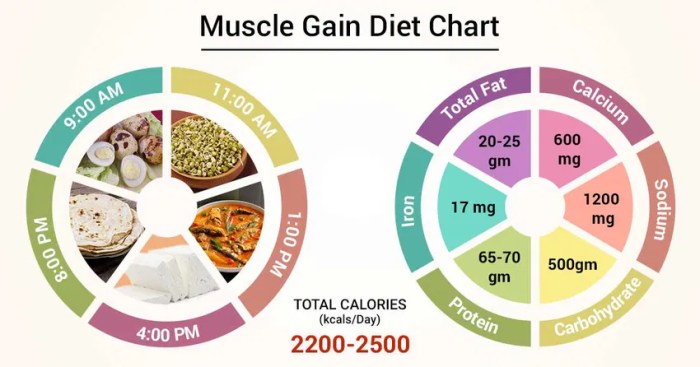Best diets for muscle gain. Ready to bulk up and build those muscles? Dive into the world of muscle-building diets that will help you achieve your fitness goals faster than ever. From high-protein meals to nutrient timing, we got you covered with all the essential info you need to know.
Types of diets for muscle gain
When it comes to gaining muscle, there are different types of diets that can help you achieve your goals. Two popular options are high-protein diets and balanced diets, each with its own benefits and impact on muscle growth.
High-Protein Diets, Best diets for muscle gain
- High-protein diets are known for their ability to support muscle growth and repair.
- Proteins are the building blocks of muscles, so consuming more protein can help increase muscle mass.
- These diets often involve foods like lean meats, eggs, dairy, and plant-based protein sources.
- Protein also helps with satiety, keeping you full for longer and potentially aiding in weight management.
Balanced Diets
- While high-protein diets focus on protein intake, balanced diets provide a mix of all essential nutrients.
- These diets include a variety of foods like lean proteins, whole grains, fruits, vegetables, and healthy fats.
- Balanced diets ensure that you get all the necessary nutrients for overall health and muscle growth.
- They are sustainable in the long run and can support muscle development while promoting overall well-being.
Remember, the key to muscle gain is not just the amount of protein consumed but also the overall macronutrient ratios in your diet.
Best foods for muscle gain
When it comes to building muscle, what you eat plays a crucial role in achieving your fitness goals. Here are some of the best foods to include in your muscle-building diet:
Top foods rich in protein for muscle building
Protein is essential for muscle growth and repair. Here are some top foods rich in protein that you should incorporate into your diet:
- Chicken breast: A lean source of protein that is low in fat and calories.
- Salmon: Packed with omega-3 fatty acids and high-quality protein.
- Eggs: A complete protein source that is also rich in vitamins and minerals.
- Greek yogurt: High in protein and probiotics for gut health.
- Quinoa: A plant-based protein source that is also high in fiber.
Examples of complex carbohydrates essential for energy during workouts
Complex carbohydrates are important for providing sustained energy during workouts. Here are some examples of complex carbs that you should include in your muscle-building diet:
- Sweet potatoes: Rich in vitamins, minerals, and fiber for sustained energy.
- Brown rice: A whole grain that is high in fiber and essential nutrients.
- Oatmeal: A great source of complex carbs and fiber to fuel your workouts.
- Beans: Packed with protein and complex carbs for energy and muscle recovery.
- Whole grain pasta: Provides a good source of energy for intense workouts.
Importance of healthy fats in a muscle-building diet
Healthy fats play a crucial role in hormone production and overall health. Incorporating healthy fats into your muscle-building diet can help support muscle growth and recovery. Some examples of healthy fats to include are avocado, nuts, seeds, and olive oil. Remember, moderation is key when it comes to fats, so be mindful of portion sizes to support your fitness goals.
Meal planning for muscle gain: Best Diets For Muscle Gain
To maximize muscle growth, it’s crucial to have a well-structured meal plan that supports your workouts and recovery. Meal timing and composition play a significant role in achieving your muscle gain goals.
Sample Meal Plan
Creating a sample meal plan for a day aimed at muscle growth involves a balance of macronutrients like protein, carbohydrates, and fats. Here’s an example of a meal plan:
- Breakfast: Scrambled eggs with spinach, whole-grain toast, and a side of avocado
- Mid-Morning Snack: Greek yogurt with berries and a sprinkle of nuts
- Lunch: Grilled chicken breast, quinoa, and roasted vegetables
- Afternoon Snack: Protein shake with banana
- Dinner: Baked salmon, sweet potato, and steamed broccoli
Pre and Post-Workout Meals
Before your workout, focus on consuming a meal or snack that provides carbohydrates for energy and some protein. A good pre-workout meal could be a banana with almond butter or a turkey sandwich on whole-grain bread.After your workout, prioritize consuming protein and carbohydrates to support muscle recovery and growth. A post-workout meal could include a whey protein shake with a banana or a chicken and rice bowl.
Significance of Nutrient Timing
Nutrient timing refers to strategically consuming nutrients at specific times to maximize muscle growth and recovery. Consuming protein and carbohydrates around your workout helps replenish glycogen stores, reduce muscle breakdown, and promote muscle protein synthesis.
Timing your meals around your workouts can optimize muscle growth and recovery.
Supplementation for muscle gain

When it comes to gaining muscle, supplementation can play a crucial role in supporting your progress. Certain key supplements are known to aid in muscle growth by providing essential nutrients and enhancing recovery.
Protein Shakes
Protein shakes are a popular choice for individuals looking to build muscle. They offer a convenient and quick way to increase your protein intake, which is essential for muscle repair and growth. Protein shakes are often consumed post-workout to support muscle recovery and promote muscle protein synthesis. It is important to choose a high-quality protein powder that contains all essential amino acids for optimal muscle-building benefits.
Creatine
Creatine is another popular supplement among individuals aiming to increase muscle mass and strength. It works by increasing the body’s ability to produce energy rapidly, allowing for more intense and longer workouts. Creatine supplementation has been shown to improve exercise performance, muscle mass, and strength gains. However, it is essential to stay hydrated while taking creatine and follow recommended dosages to avoid potential side effects like dehydration and muscle cramps.
